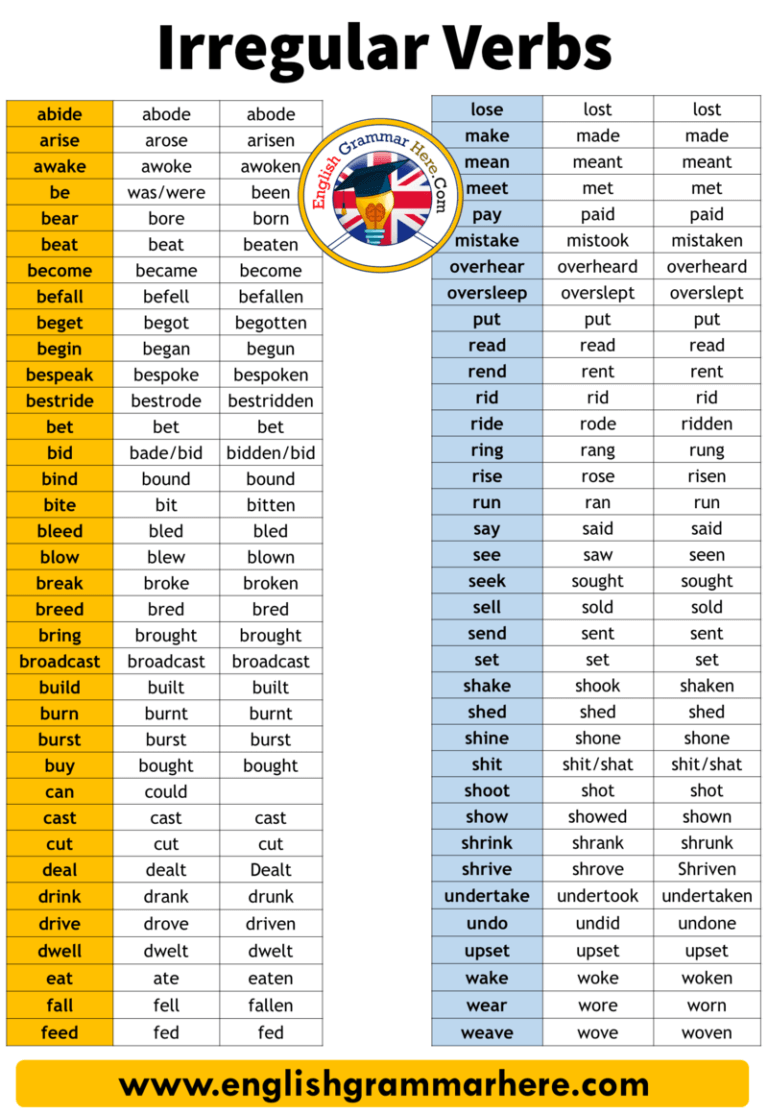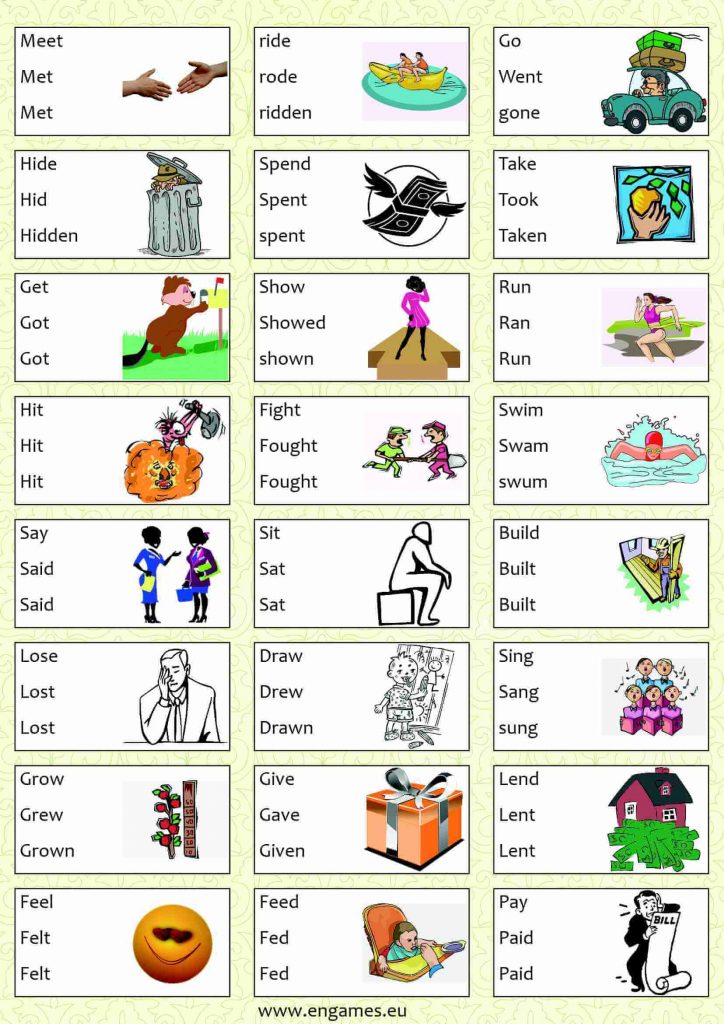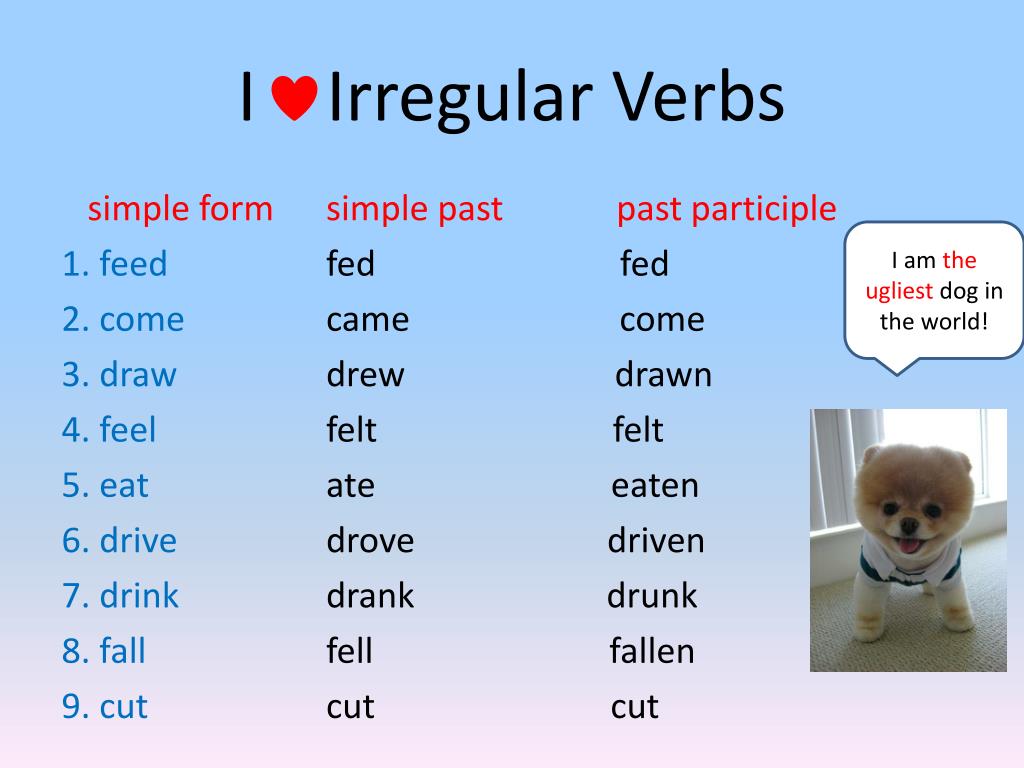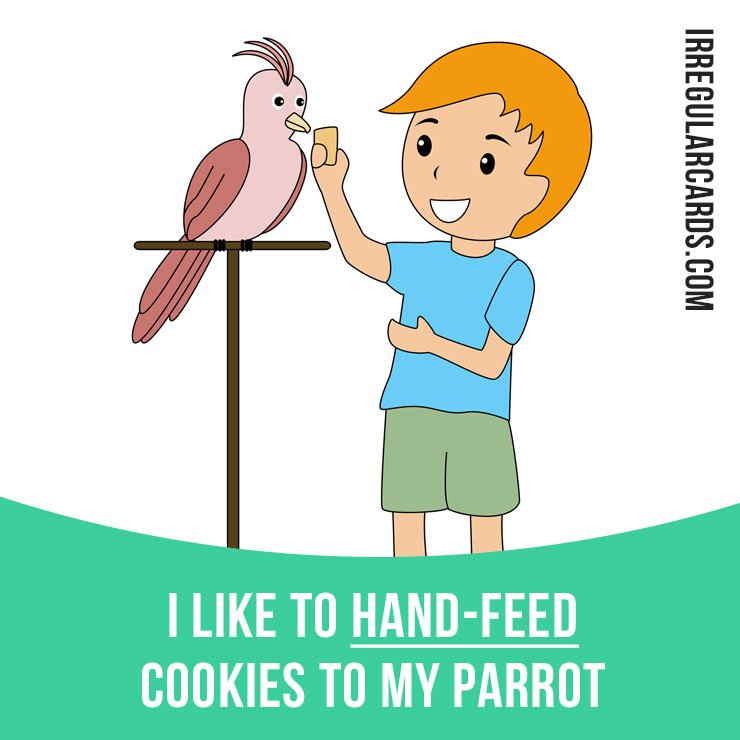
Irregular Verb feed feed verb 3ข้อมูลที่เกี่ยวข้องทั้งหมด
The Most Common Irregular Verbs. The most common irregular verbs in English are be, have, and do. Aside from these three (which deserve a special status for being both main or auxiliary verbs), the top 10 irregular verbs in English are: see, say, go, come, know, get, give, become, find, and think. Show me an infographic.

Feed Past Simple, Simple Past Tense of Feed Past Participle, V1 V2 V3 Form Of Feed Feed means
List of English irregular verbs. Infinitive Simple Past Past Participle; alight: alighted, alit: alighted, alit: arise
Irregular verbs Random wheel
This list contains all the irregular verbs of the English language. Each entry includes the base or bare infinitive first, followed by the simple past (V2) form and the past participle (V3) form. Taking some time to make sentences using each irregular verb form will help you to use these verbs correctly when speaking and writing.

Simple Present Tense Examples In Punjabi AliciaNibbi
verbs ending in -e: like. feed - model verb. did feed: you: did feed: he, she, it: did feed: we: did feed: you: did feed: they: did feed: Compound continuous (progressive) tenses.. *Blue letters in conjugations are irregular forms. *Red letters in conjugations are exceptions to the model. Report a problem..

irregular verbs Archives English Grammar Here
Like "be," quite a few other linking verbs are irregular as well, such as "become" and "feel." Also, irregular verbs can be either transitive or intransitive verbs and can still be used as imperative verbs.. Strong vs. weak verbs. Irregular verbs and regular verbs are often confused with strong verbs and weak verbs, although they are very similar.

Irregular Verbs Englisch FeedFlung (+DE/ENG+Aussprache) YouTube
The past forms for irregular verbs are not regular -- you just have to learn them. Sometimes people study these verbs in groups based on the past simple form -- for example, 'buy', 'bring' and 'think' all have '-ought' in their past simple form: 'bought', 'brought' and 'thought'. All the best, Kirk The LearnEnglish Team

Irregular Verbs Puzzle Flashcards (Part 1)
The irregular verbs in the table below have the same pattern as feed. They are: - Verbs with the same past simple and past participle forms. - Verbs like 'bend, bent, bent'. Verb Simple past Past Participle; abide: abode/abided: abode/abided/(rare) abidden: alight: alit/alighted:

Irregular Verbs HighQuality Essays Writing
The feed past tense is "fed". The verb feed is classified as irregular, so its V2 rule doesn't have the -ed after the verb's basic form. The feed in past tense and the feed past participle have the same written form, which is fed. So the past and the past participle of the verb "feed" are similar. Simple Present.

PPT I Irregular Verbs PowerPoint Presentation, free download ID2605003
This is a list of some irregular verbs in English. Of course, there are many others, but these are the more common irregular verbs. You can test yourself with these fun irregular verbs quizzes. V1. Base Form. V2. Past Simple. V3. Past Participle.

Irregular Verb Cards on Twitter ""Handfeed" to feed a person or an animal by hand.
Irregular Verbs: Overview and List. In English, regular verbs consist of three main parts: the root form (present), the (simple) past, and the past participle. Regular verbs have an -ed ending added to the root verb for both the simple past and past participle. Irregular verbs do not follow this pattern, and instead take on an alternative pattern.

List of Irregular Verbs in English Grammar Irregular verbs, English verbs, English grammar
The verb "feed" is an irregular verb. (This means that "feed" does not form its simple past tense or its past participle by adding "-ed" or "-d" to the base form.) The Five Forms of "To Feed" Form feed Alternative Name; Base Form: feed: Infinitive Form: The -S Form: feeds: Third Person Singular Form: Past Form: fed:

"Feed" means to give food to a person or an animal. Example I haven’t fed the cat yet
Subjunktiv of the irregular verb [feed] The subjunctive is a grammatical mood, a feature of the utterance that indicates the speaker's attitude toward it. Subjunctive forms of verbs are typically used to express various states of unreality such as: wish, emotion, possibility, judgement, opinion, obligation, or action that has not yet occurred.

Irregular verbs "deal", "dig", "do", "dream", "drink", "drive", "eat", "fall", "feed" English
English verb conjugation to feed to the masculine. Irregular verb: feed - fed - fed.

Hello everybody! 😊 Our irregular verb of the day is “Spoonfeed”, which means “to feed someone
There are two types of such verbs. Those ending with -eed are the following: bleed - bled - bled. breed - bred - bred; also "crossbreed", "inbreed", and "interbreed". feed - fed - fed; also "overfeed". speed - sped or speeded - sped or speeded. Both "speeded" and "sped" can be used as the past tense.
irregular verbs part 2 (first 18 verbs) Combinação
English verb TO FEED conjugated in all forms, with full audio, irregular highlighting, negative forms and contractions.

How do we use the irregular verb to feed? YouTube
Intransitive verb. (especially of animals) to take food; eat: cows feeding in a meadow; to feed well. to be nourished or gratified; subsist: to feed on grass; to feed on thoughts of revenge. Transitive verb. to give food to; supply with nourishment: to feed a child. to yield or serve as food for: